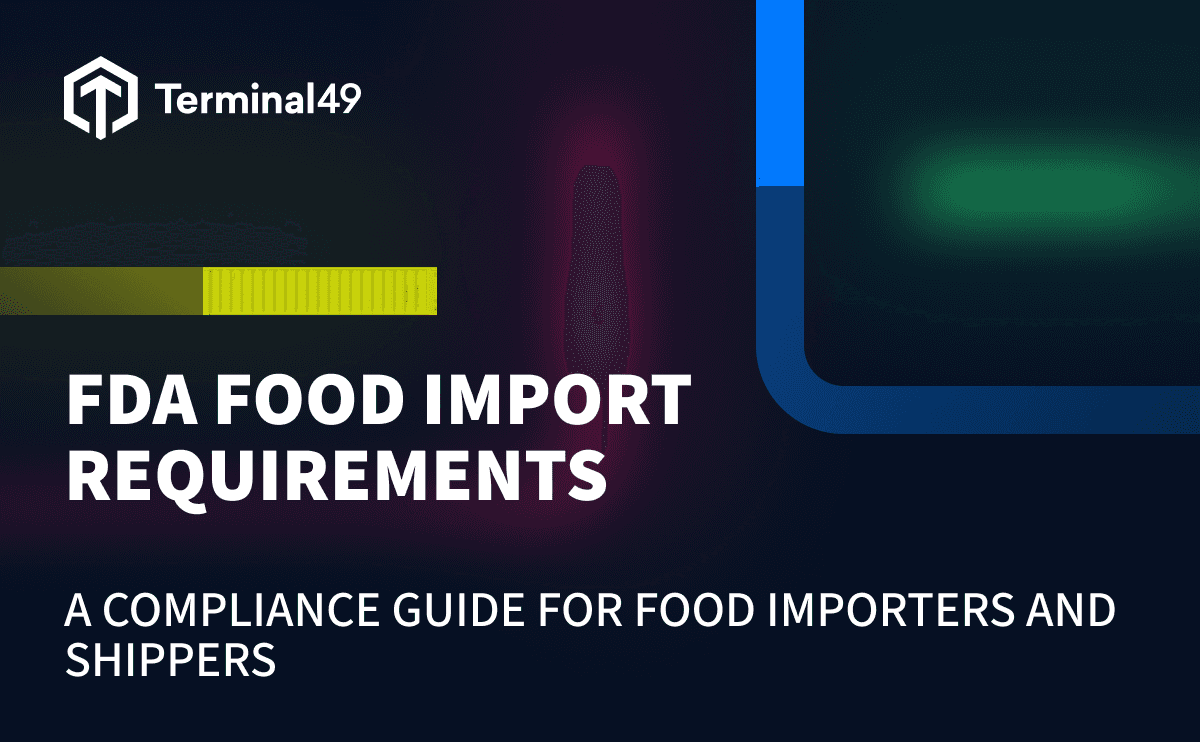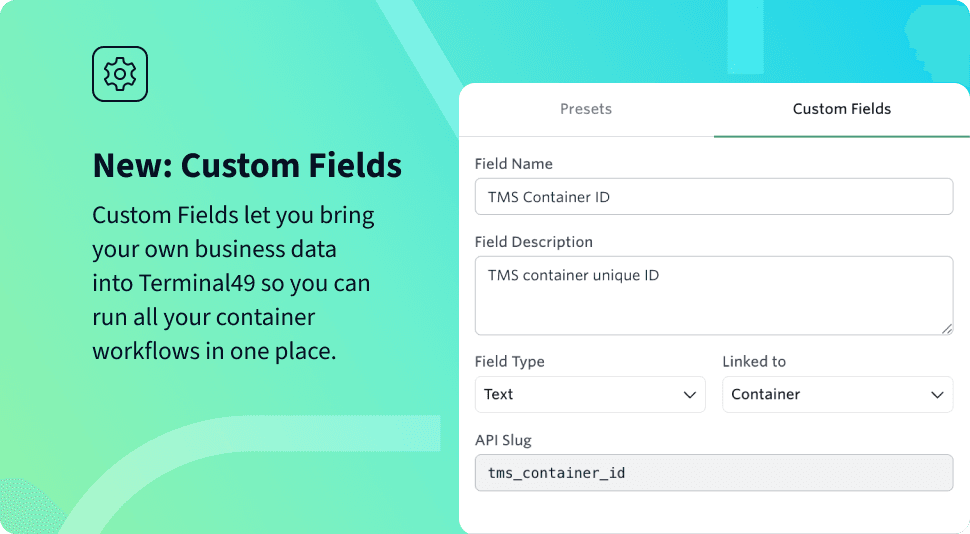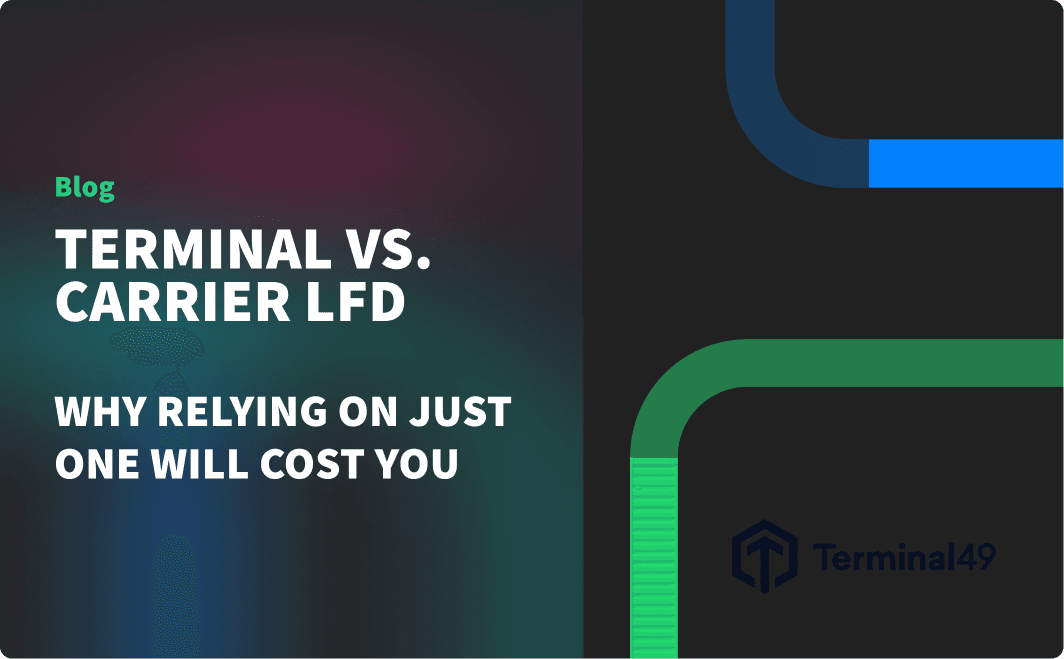Why Food Import Compliance Matters More Than Ever
Food imports are essential for meeting U.S. demand for diverse, seasonal, and specialty foods — but importing food into the U.S. is far from simple. Navigating FDA food import requirements and U.S. Customs and Border Protection (CBP) regulations can be overwhelming and time-consuming.
From complying with the Food Safety Modernization Act (FSMA) to managing customs paperwork and avoiding delays, food importers must meet strict requirements or risk fines, detentions, spoilage, or even rejected shipments.
This guide simplifies the process, helping you stay compliant, avoid disruptions, and streamline your food import operations. Let’s break it down.
FDA Regulations and Requirements For Food Import
Understanding the rules allows for easy implementation. To navigate them, it is crucial to know what they are, why they exist, and the FDA's expectations for each food importer.
1. Food Safety Modernization Act (FSMA) and FSVP
The FDA and FSMA would rather enforce preventive measures than corrective measures, mainly because the challenges of a disease outbreak or something worse can be too much to overcome. For the FSMA, this means that food importers must comply with key rules, such as the Preventive Controls for Human Food (PCHF) rule, which mandates the implementation of risk-based preventive controls, and the Foreign Supplier Verification Program (FSVP), which requires importers to verify that their suppliers meet U.S. food safety standards.
2. Prior Notice Requirements of Imported Food
Food importers must submit prior notice to the FDA before their shipments arrive in the U.S. to help the FDA identify and respond to potential food safety risks. However, this requires accuracy and timeliness, which are essential because incomplete or late submissions will likely lead to detentions or refusals.
3. Labeling Requirements
Every imported food product must comply with strict U.S. labeling regulations, including:
- Nutrition facts
- Ingredient lists
- Allergen declarations
- Country of origin,
Because U.S. Consumers have come to rely on them to make the right decisions for their health and nutrition, incorrect or missing labels often trigger shipment rejections or relabeling delays — both expensive outcomes.. Specific categories, such as organic foods or dietary supplements, have additional requirements when labeling foods. Ensuring compliance with these standards helps avoid costly relabeling or rejections.
4. Food Additives and Color Additives
The FDA regulates food and color additives, requiring only approved substances within specified limits. Food importers must verify that product additives align with FDA guidelines to avoid violations.
5. Bioterrorism Act Requirements
Food facilities must register with the FDA and maintain detailed records for traceability and transparency. These requirements aim to enhance the FDA's ability to respond to potential threats to the food supply.
CBP Regulations: The Customs Side of Food Importing
Under the guidance of the FDA, customs have set up or established specific regulations to ensure that foods coming into the country meet all the FDA requirements. This way, all the parties involved will be sure of what is coming into the country.
1. Entry Documentation
Accurate and complete documentation is critical when importing food. It ensures a smooth customs clearance process, but more importantly, it is used to keep accurate records of what is coming in for the American people.
This includes:
Please note that errors or omissions in these documents can result in delays or fines.
2. Customs Bonds
Food importers in the U.S. must post a customs bond to ensure compliance with CBP regulations. The bond is supposed to act as a financial guarantee for paying duties and adherence to customs requirements. Food importers may see it as an incentive to do the right thing and on time.
3. Tariffs and Duties
CBP determines tariffs and duties based on the Harmonized Tariff Schedule (HTS) codes assigned to imported goods. Proper classification is crucial to avoid overpayment or penalties.
4. Import Quotas
Like some other products, food is subject to import quotas, which limit the quantity that can be brought into the U.S. Examples of such foods include dairy goods, sugar, and meats. Food importers must be aware of these restrictions so that they can plan accordingly, especially to avoid the financial stress of the CBP's rejection or detention of shipments.
5. Anti-Dumping and Countervailing Duties
These duties apply when imported goods are sold at less than fair market value or benefit from unfair subsidies. Importers should understand how these measures might affect their products and take action to avoid challenging ripple effects.
Common Challenges for Food Importers and How to Avoid Them
Food importation is not without its challenges. However, they can also be overcome. Here are some of the challenges and how to navigate them successfully.
1. Border Delays and Spoilage
Customs clearance delays can be costly, particularly for perishable food imports. Delays often arise due to incomplete documentation, misclassification of goods, or missing FDA prior notices. One of the best ways to mitigate this risk is by leveraging real-time shipment tracking.
How Real-Time Container Tracking Helps:
- Proactive Issue Resolution: Tracking systems like Terminal49 provide instant updates on customs holds or missing documents, allowing importers to take action before shipments are delayed.
- Visibility Across the Supply Chain: By integrating tracking data with customs requirements, importers can anticipate delays and prepare necessary documentation in advance.
- Reduced Risk of Spoilage: Perishable food items require tight control over transit times. Tracking ensures that shipments do not spend unnecessary time in customs, reducing financial losses from spoilage.
Lawrence Wholesale tracks their reefer containers with automated updates, reducing manual work and minimizing the risk of spoilage due to delays. They use Terminal49’s risk alerts to stay ahead of potential disruptions and avoid costly demurrage and detention fees
2. Detentions and Refusals
FDA and CBP may detain shipments due to labeling violations, contamination concerns, or incorrect paperwork. When shipments are detained, importers often struggle with slow communication and uncertainty about the next steps.
How Real-Time Container Tracking Helps:
- Real-Time Alerts: Terminal49 provides alerts when a shipment is flagged for inspection or detained by customs.
- Enhanced Traceability: Having clear visibility into where products are sourced and how they are transported helps address FDA inquiries quickly, preventing extended detentions.
- Data-Driven Compliance: Importers can use historical tracking data to identify recurring compliance issues and proactively correct them before future shipments.
3. Lack of Shipment Visibility and Coordination
Beech-Nut uses Terminal49 to track transshipments across LATAM into US Terminals. Many delays at customs occur because importers don’t have real-time visibility into where their shipments are, what stage they’re in, or whether any documentation or inspections are pending. Without proactive tracking, importers may find themselves reacting to issues too late, resulting in costly storage fees, spoilage, or missed market opportunities.
How Real-Time Container Tracking Helps:
- Prevents Unexpected Delays: Terminal49’s platform provides instant status updates on customs clearances, helping importers take corrective action before a delay turns into a major disruption.
- Better Coordination with Customs Brokers: Importers can share real-time tracking data with their customs brokers, ensuring faster processing and fewer errors.
- Avoids Costly Storage Fees: By knowing exactly when a shipment is held or released, importers can avoid unnecessary demurrage and storage costs.
4. Unverified Product Provenance and Compliance Risks
Regulatory bodies like the FDA and CBP require importers to verify the origin, handling, and safety of food products. A lack of traceability can lead to import detentions, rejections, or even recalls if there’s suspicion of contamination or mislabeling.
How Tracking Helps:
- Ensures Compliance With FSMA’s FSVP Requirements: Terminal49 centralizes data on past shipments, making it easier for importers to verify supplier compliance with U.S. food safety laws.
- Provides Full Shipment History: Detailed tracking logs allow importers to prove their food products were sourced, stored, and transported according to FDA regulations.
- Reduces the Risk of Rejections: By maintaining complete traceability, importers can respond quickly to regulatory inquiries and avoid supply chain disruptions.
Best Practices for Food Importers
Food importation can be challenging, especially for importers or businesses without ample information. However, best practices can simplify the process and ensure minimal to zero friction.
Here are some of them:
1. Develop a Strong Food Safety Plan
Ensure the food safety plan complies with FSMA requirements. Beyond that, regularly review and update it to address new risks or regulations.
2. Maintain Accurate Records
A detailed and well-organized record will facilitate compliance and traceability, which is important for meeting the FSMA and Bioterrorism Act requirements.
3. Establish Clear Communication Channels
Having strong communication with suppliers and customs brokers can prevent misunderstandings and ensure timely responses to regulatory inquiries.
4. Stay Informed About Regulatory Changes
FDA and CBP regulations are subject to updates. In fact, they regularly update their policies and regulations. Keeping up-to-date helps importers adapt and maintain compliance.
5. Use Technology to Streamline Processes
Leverage technology to automate documentation, monitor compliance, and track shipments. These tools can enhance efficiency and reduce errors. Brecon Foods tracks their cargo's entire journey from producer to buyer, with all the milestones updating automatically in their ERP.
6. Working with a Customs Broker
Licensed customs brokers can provide valuable assistance in managing the import process. They help with entry filing, compliance, and communication with CBP, reducing the likelihood of errors and delays.
Navigating Food Importation With Terminal49
Terminal49 is the leading choice for specialty food and frozen importers for container visibility. Our customers span frozen seafood, wholesale meat commodity trading, specialty customs brokers, and more. Some of our clients include Wismettac, Sun Orchard, and MGX Beverage.
Terminal49’s platform provides importers with visibility and a clear view of regulatory requirements and processes, reducing uncertainty and helping them prevent compliance-related delays. By centralizing access to important documentation, deadlines, and customs updates, the platform enables food importers and their supply chain to stay on top of requirements by preventing missed steps or oversights.
The system also automates notifications about regulatory changes, document submissions, and inspection statuses, allowing importers to take action promptly. This level of organization and foresight streamlines operations, saving time and avoiding costly interruptions caused by non-compliance.





